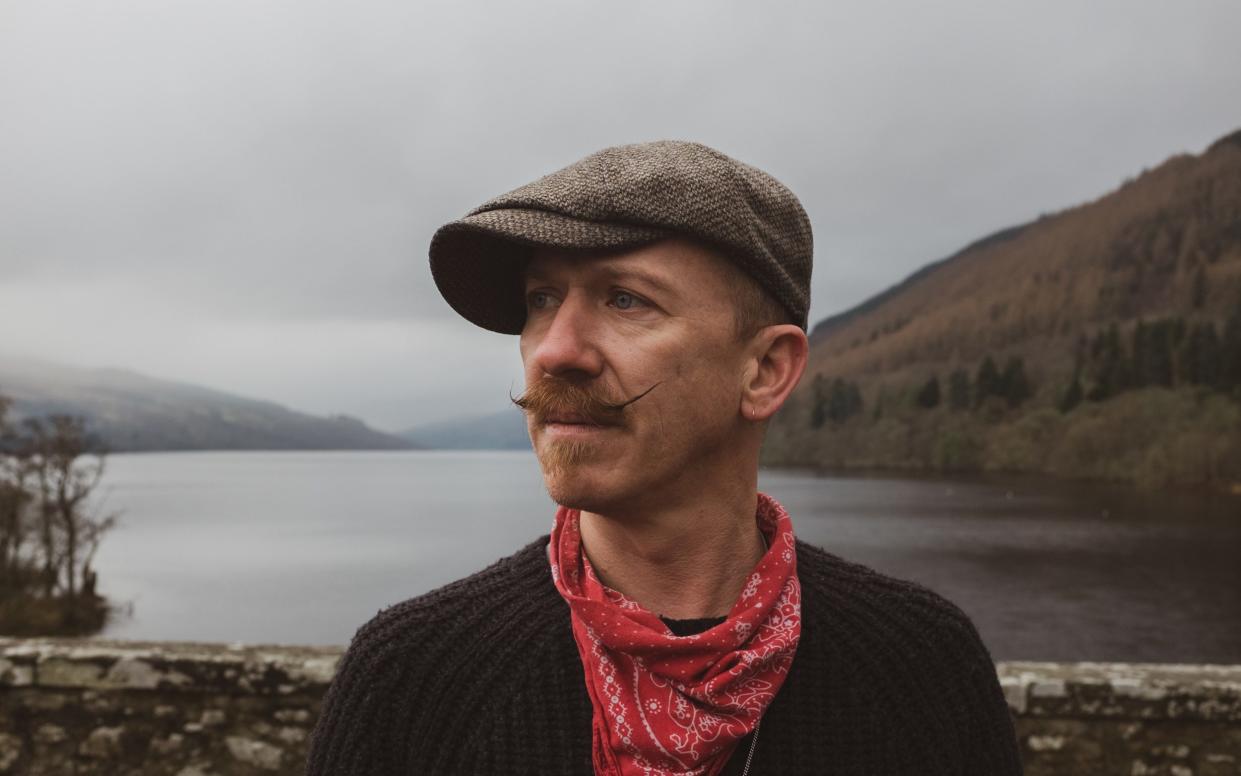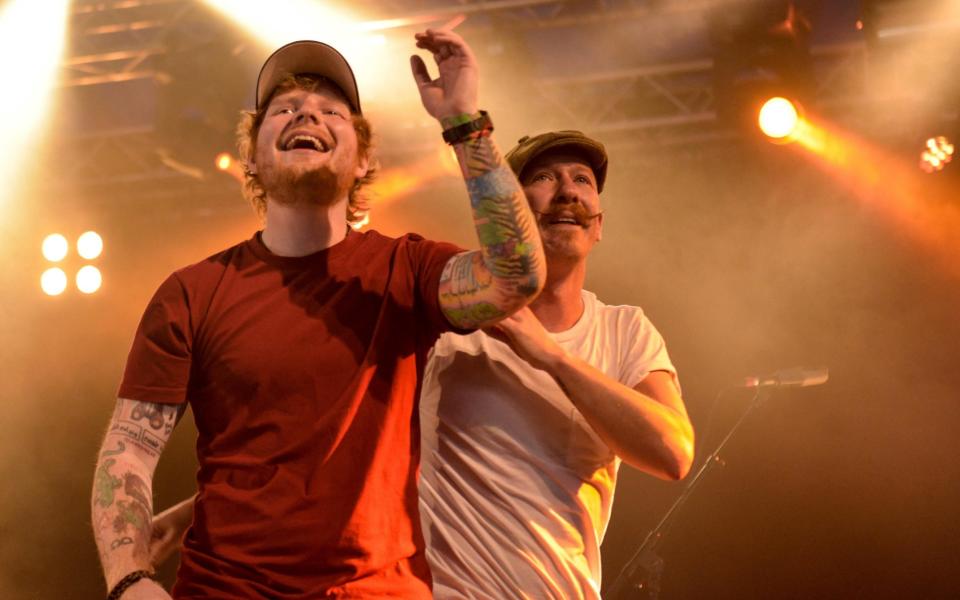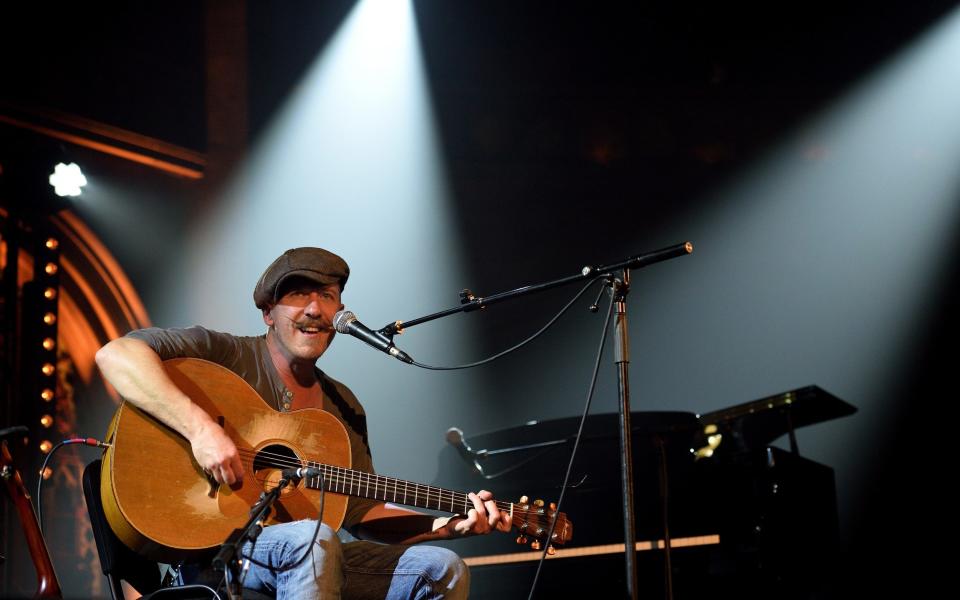Why Ed Sheeran and Elton John idolise Foy Vance: ‘I grew up wanting to be him’

In the song The Hills of Aberfeldy, the closing, Celtic-tinged ballad on this year’s chart-topping [Subtract] album, Ed Sheeran sings: “Oh, the leaves are covered in snow / And the water’s frozen / Oh, I long for you to be the one that I’m holdin’ / And warm me down to my bones / As you lay beside me, hold me close…”
This early winter’s morning in the actual hills of Aberfeldy in highland Perthshire, the snow is indeed falling on the pines, the temperatures are sub-zero and, as Sheeran’s co-writer attests, this picturesque small town 75 miles north of Edinburgh, a 10-minute drive from the shores of Loch Tay, is a magical place to live – and be inspired by.
“We’d finished touring together,” Foy Vance remembers, “and Ed came up. As everyone does when they come here, he’s like: ‘What the f___?’ Have we gone through a portal?’ Because this place is otherworldly. He fell in love. And that song fell out of us.”
That climactic song on Sheeran’s sixth studio album is only the latest example of a creative partnership that’s as deep as it is strong. Vance was the second signing to the star’s Gingerbread Man Records, label home to six Vance albums, and the pair have co-written multiple tracks, including Galway Girl and Emmy-nominated Ted Lasso song A Beautiful Game.
They have now worked together on a song for the 10th anniversary edition of Vance’s 2013 album Joy of Nothing, a new take on his second album’s glorious stand-out track, Guiding Light. But rather than being a bog-standard remix, the 2023 version is a rerecording featuring vocals from Sheeran, Elton John and Keith Urban, and fresh production from Snow Patrol’s Johnny McDaid.
What are three of the biggest artists in the world doing on a song written by a relatively unknown singer-songwriter? Or, in the typically no-nonsense words of the man himself: “Who the f___ is this wee, baldy, Irish guy in his 40s singing about his dead dad?”
Vance is a twice-separated father-of-three from Bangor, County Down whose UK tour this month hits Leeds’ 400-capacity Brudenell Social Club and the 450-capacity Rescue Rooms in Nottingham (although, to be fair, he has over 1.7 million monthly Spotify listeners). But if he remains underappreciated in the wider musical world, his peers know: Foy Vance is The Songwriter’s Songwriter.
“It’s the most beautiful song,” says Elton of Guiding Light. “When Foy asked me to do it, it was a no-brainer for me because I’m such a huge fan of his.”
When, in June, he played Aberdeen during his Farewell Yellow Brick Road tour, Elton invited Vance and his two young sons to come see the show and collect the audio files of his vocal contribution to Guiding Light. Sitting backstage, he played the demo to the Vance boys and then immediately said, excitedly: “Do you want to hear it again?” As the Irishman sees it, Elton still has that “youthful excitement” about music.
As for Urban, he remembers hearing Joy of Nothing not long after its original release. “I was in London and I was on my bike, riding around the streets one day, listening to the album,” the country music superstar tells me over the phone from Nashville, where he lives with wife Nicole Kidman. “And Guiding Light came on. It literally stopped me in my tracks. I had to pull my bike to the side of the road, and let this song just wash over me.”
Deep-diving into YouTube clips of Vance performing, “I just became an admirer immediately,” says Urban. Another Vance song, Burden, from his 2016 album The Wild Swan, also leapt out at the New Zealand-born artist. “I wanted to work up a version I could do and maybe flip into [my concerts] somewhere. We ended up deciding to record it and release it – and perform it at the Academy of Country Music Awards in Las Vegas [in 2019]. It’s just an extraordinary song and he’s an extraordinary songwriter.”

Sheeran’s connection with the Irishman goes back further still. “I was a Foy Vance fan from the age of about 15,” says the singer, who’s now 32. “I went to a load of his gigs back then, and he used to end with Guiding Light. It was a song I was obsessed with. I learnt it in my bedroom and I used to play it at pub shows and stuff like that – trying to be Foy.
“When we got to know each other, I asked him why he’d never recorded it. ’Cause I only found videos on You Tube, that’s how I learnt it,” continues Sheeran. “And I really encouraged him to record it. And when he was recording it, he was like: ‘Well, why don’t you sing it with me, if you’ve been singing it for all these years?’”
The result was a collaboration on the original, 2013 version of the song. But Vance, if he’s honest (and he always is, brutally) is foggy on the details of how it came about. “Apparently I first met Ed at Norfolk Arts Centre but I don’t remember that,” he says with shrug and a grin. “His dad brought him up to say hello and got a CD signed.”
If Sheeran was “about 15”, that would have been sometime not long after 2006, the year Vance released his first single. He was already 32, having spent his 20s as a jobbing singer-songwriter, playing pubs and clubs, living in London and (for a year) Lanzarote, and earning extra beans working in coffee shops and warehouses.
In 2013, propelled by the success of his Sheeran co-writes, Vance is an in-demand collaborator, writing with and for the likes of Alicia Keys, Miranda Lambert, Robbie Williams, BTS and James Blunt. He wrote a song Coco, inspired by the daughter of Courtney Cox, partner of McDaid, for which the Friends actor directed the video. Through those lean years, however, he was driven by both “the power of song” and “stubbornness – but also mixed with looking down the barrel of a future working in a store room. That was the only thing I was terribly good at because it was away from people, stacking things, moving shit around.”
He was trying to write songs, but they “were all bullshit”. Then, in January 1999, his father, a preacher, died. “That was the night I started writing from a new place.” He ploughed on, refining his craft. “It was all I wanted to do. Some people golf. Some people have whatever. I had song. I ate, slept and breathed it, I didn’t want to know about anything else.”
He “easily” did his 10,000 hours in the eight years leading up to the release of his debut album, 2007’s Hope. “If I wasn’t working, I had my guitar in my hands. Actually I made an album a good few years before, 2000 I think it was. It’s right over there, on a quarter-inch tape,” he says, pointing behind me to a stack of dusty tape reels lurking amidst the clutter of a studio filled with multiple guitars and keyboards. “It’s never been released and never will be,” he says of an album he disparages as only having one song good enough for public airing, on Hope.
But even when Sheeran, the epitome of a teenage wunderkind, landed his own record deal, Vance rebuffed him. “He got my email through a mutual photographer friend of ours and reached out about writing. He sent me The A Team,” he says of the song that eventually became Sheeran’s debut single, in 2011, “and another song, I can’t remember what it was.” Sheeran was keen to collaborate, a notion that didn’t compute for Vance.
“Loads of people had said to me, ‘we should write together’. I genuinely didn’t understand why we would do that. To make money? That’s not what music is to me. So by the time Ed came along, I was in that mindset. I couldn’t comprehend why I’d do that. I got back to him: ‘Look, these songs are great, dude. But this isn’t a vernacular [I understand]. I don’t know what I’d add, so I’ll pass.’ But we kept in contact and, I guess, remained friends.”
Then, right away, Sheeran started having hits. “People were like: ‘Why didn’t you write with him?’ I was like: ‘He clearly didn’t need me! He’s fine on his own.’”
Sheeran remained keen to work with, to support his de facto mentor (even if the mentor was oblivious). In 2012 he invited Vance to support him on tour. “That’s when I really got to know him, and also how we got writing [together]. But literally weeks before that tour kicked off, my first marriage broke down. I had Ella, who was nine at the time.
“I called him up and I was like: ‘Dude, I don’t think I’m gonna be able to go on this tour.’ Which was gutting, because when does a 38-year-old songwriter who does my type of songwriting ever get asked on a pop star’s tour? But then I had to call him and say: ‘I’ve got Ella with me, I might need to stay at home…’ He said: ‘Just bring her. There’s a bed and a bus.’ In that moment alone, it solidified Ed as someone very pertinent in my life. Just a solid human.”
On that tour, Sheeran asked if Vance would join him onstage at Nashville’s Ryman Auditorium, to finish his headline set with a joint rendition of the as-yet-unrecorded Guiding Light. It was already an important song to Vance, written in the anticlimactic aftermath of the release of Hope, “which had turned into vapour as far as I could tell.

“It’s fair to say I had faith of some sort at some point,” he says. “But that had decomposed. I was feeling devoid of meaning. That song signified something very simple, a subtle change in mindset. The nothingness of it was what was important. Loads of people thought it was about a person or God. It’s about song – the song is my guiding light, the thing that lights the path, that gives me a reason to get up the next day.”
Sheeran recognised that quality, and so did the enraptured crowd in Nashville. “And when we got offstage, Ed was like: ‘We should [record] this together.’ And I couldn’t think of any other reason to have someone on that track. The stars aligned. But I knew how it could have been perceived: Foy’s getting a pop star to sing this song with him. But I didn’t really give a f___. I thought: if ever there’s a song that I’d share with anyone, it’d be this song with Ed – because of the guiding light he’d been to me.”
The result: a song that Urban describes to me as quintessentially timeless. “Guiding Light is more like a hymn than a song,” he says. “It’s one of those beautiful songs that you think was written a hundred years ago alongside Amazing Grace and it’s just floating around in the ether. I find it hard to comprehend that it’s a new song relatively speaking, because it’s got such an old soul. It’s one of those magical gifts, a spiritual blanket that wraps around you when you need it.”
In the end, Vance and Sheeran sealed the deal with matching tattoos, inked on tour in Pittsburgh: “nuair is gá dom fháil bhaile, is tú mo réalt eolais”, it says in Irish, which translates as “when I need to get home, you’re my guiding light”, a lyric from the song. “How bromance is that?” says Vance with a self-aware wink.
And through Sheeran, he met Elton John. “Ed introduced Elton to my music and he liked it. It’s as simple as that. One time in LA Ed was like: ‘Do you wanna come have dinner with Elton tonight?’ I was like: ‘Let me check my diary…! So we went, we hung out… I used to drink very heavily, and that ties in with one of the many reasons Elton is involved. Him and I had lots of chats.”
Vance and I have previously talked about his raging enthusiasms. Two years ago he said to me: “Getting off the road, one of the things you realise is: wow, I drink two bottles of wine and at least a half bottle of vodka a day. Then I’d start the day with codeine to get myself sorted. And I’d smoke joints throughout the day. I realised: I have so many incredibly bad habits here. I’m showing all the signs of death, getting ashen, grey, smoking more, drinking more, smoking more… And I hit a wall.”
Were those chats with Elton about his addictions? “About sobriety,” he replies. “Not to put too fine a point on it, but Elton was a guiding light, too, if you like. One of my worries about cleaning up my act was that I’d lose something of myself. He was one of the first people that I was able to look at and go: look at him. He’s living the dream and has been for the last 20 years. He was 44 when he got sober and never looked back.”
Two years ago, Vance managed to self-detox by taking himself to bed for three days. “I got rid of the codeine in that three-day sweat-out, yeah. I went back on the vodka, weed and nicotine after that. I used to say I was an alcoholic, but I don’t know… I think it was circumstantial for me. It was a mask. And was able to stop – I haven’t had a drink since December last year, just because I’d had enough. I don’t think if you’re an alcoholic that that’s possible without rehab or AA.”
But now, thinking back, he credits the example of Elton: “Seeing him during that time, happy as a pig in muck, living his best life, doing exactly what he wanted, an insatiable desire for music… His life was full.”
And so now, too, is Vance’s. When we meet in Aberfeldy, he’s three days back from an Australian tour and he’s on dad duties for his two boys, Sonny, six, and Sol, three (Ella is now 20). This month’s Irish and UK tour is followed in the new year by a second leg of an American run, with European dates to follow.
All of which begs the question: why is Foy Vance not better known? “Ha ha, that is the million dollar question!” says Keith Urban. “Foy’s too cool for school,” he begins, referring to Vance’s unwillingness to overly commercialise his own work. “Foy is a pure, pure poet – he reminds me a lot of Van Morrison. And there are some artists who, fortunately or unfortunately, [only] other artists get them. But hopefully situations like this, this re-working of Guiding Light, will bring Foy to a wider audience. Because a lot more people need to know of him. He absolutely deserves that. There’s a massive audience out there for him that don’t know yet how great he is.”
For his part, Vance is nothing but grateful for the approval of his famous friends. As he puts it: “If there was any way of decelerating their career, it’s by working with me!”
Still, that reputational damage could go both ways. How does a purist, and an Irishman at that, justify the existence of Galway Girl? “Oh dear!” laughs Vance. “Can I plead the Fifth? There is no justification,” he says gamely. “But this is the thing when you’re writing with someone else: I’ll go wherever he goes… I’m not there to pass judgement. And I do make suggestions from time to time with Ed. Like, do we have to mention Doritos [as he does in Galway Girl]?”
And it sounds like it could have been worse. “When he was going for Galway Girl, which was contentious already, because there’s a very famous song with that title, some of the things he was going through… Bangor Girl, Derry Girl, Portlaoise Girl… F___’s sake, mate!”
Maybe the royalties from Spotify streams in excess of 1.2 billion for that co-write alone have sweetened the blow for Vance. How well, though, does his own songwriting pay for him?
“My own? Not terribly well! Enough to pay the bills,” he says, the unspoken addendum being, of course, that royalties from co-writes on multi-million-selling and -streaming Ed Sheeran albums mean it doesn’t matter that in London he can “only” sell out the 900-capacity Union Chapel in Islington. “I’m investing my life in this. Win, lose or draw, I’ve felt successful. Paying the bills doing what you love? If that’s not success, I don’t know what is. So it’s never been about what I can make from it. What I get from it, money couldn’t buy.”
Joy of Nothing (Anniversary Edition) is out now. Foy Vance is touring the UK until December 19
